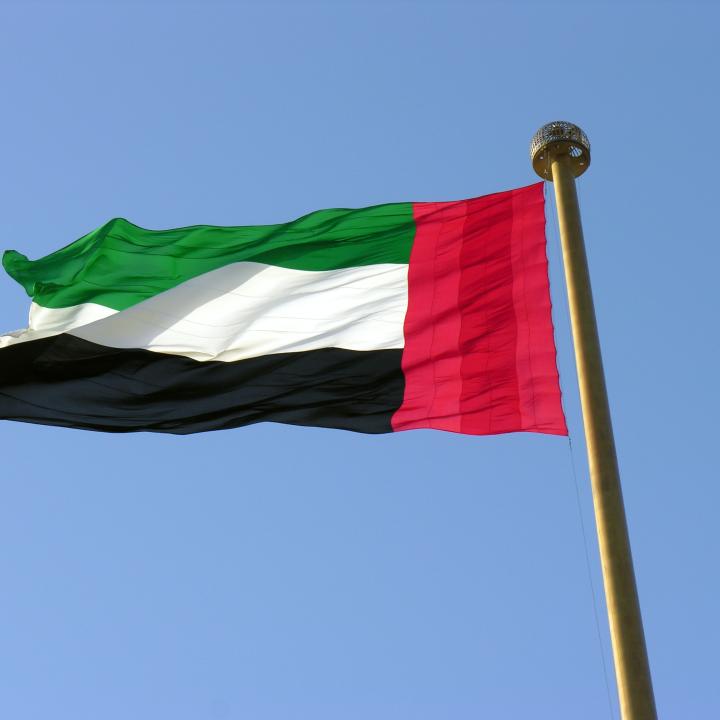
- Policy Analysis
- Fikra Forum
July/August 2022 UAE Survey Shows U.S. Leads Iran, but Lags Russia and China

For the most recent polling data from the UAE, see our November 2022 data here.
Emiratis share their views on global players, regional dynamics, and economic conditions.
A new, special public opinion poll in the UAE, commissioned by the Washington institute and conducted July 20-August 11, 2022 by a regional commercial company, reveals that citizens of that Arab state—as in Saudi Arabia next door—currently rank both China and Russia ahead of the United States in perceived importance to their own country. The survey was conducted right after President Biden attended an Arab Gulf summit in Jeddah, Saudi Arabia. Just 28% of Emiratis expect his visit to have any positive effects on the region.
Russia, China, and EU Ahead of U.S. or India in Perceived Importance
The key question was worded as follows: “For different countries outside our region, regardless of how you view their policies, how important do you think it is for our country to have good relations with each one?” Virtually tied for first place, as either very or somewhat important, are Russia (55%) and China (52%). The EU is next, at 48%. Trailing behind are the United States (44%) and India (42%), the latter of which has millions of guest workers in the UAE.
Other responses suggest that an American “trust deficit” is at least partly responsible for the counter-intuitive findings noted above. After the more general, neutral questions, the survey included one question posing this purposely blunt formulation: “We cannot count on the United States these days, so we should look more to Russia or China as partners.” The majority (60%) of Emiratis—approximately in line with their Saudi neighbors—now agree with that harsh assessment.
Asked even more specifically to prioritize their desires from Washington, Emiratis, again like their Saudi cousins, offer mixed responses. Advanced weapons, regional peacemaking, economic deals, and “respect for our religion and culture” each obtain around a quarter of Emirati votes, as either their first or second priority for American policy toward them.
But Russian Policy Toward Ukraine Solidly Unpopular
Notably, this relatively positive view of Russia’s importance exists despite wide disapproval of its invasion of Ukraine. Three-quarters of Emiratis (as of Saudis polled at the same time) voice a negative opinion on that matter. Moreover, nearly two-thirds (63%) agree that “the Russian military action in Ukraine is to blame for the recent rise in food prices here.”
Iran Rates Very Low, Even Among Shia Minority; Nuclear Deal Narrowly Opposed
Regarding various regional powers, Iran stands out as the least favorably viewed in the UAE. A mere 13% of Emiratis think it even “somewhat important” to have good relations with Tehran. That figure climbs a bit to 25%, however, among the roughly ten percent Shia minority of UAE citizens. A narrow majority (58%) overall also view “the renewed nuclear deal with Iran” negatively. Yet a surprisingly large minority (35%) say the deal will have a positive effect on the region.
Little Enthusiasm for Rapprochement with Turkey and Syria, But Yemen Cease-Fire A Hit
On some other regional issues, UAE citizens largely voiced views at odds with their government’s recent moves. A mere 25% of Emiratis say it is even somewhat important for their country to have good ties with either Turkey or Syria. By comparison, an unexpectedly larger proportion (41%) attach some importance to good relations with Iraq.
In sharp contrast to this lukewarm appraisal, the Yemeni cease-fire, in effect for the past few months, garners solid popular approval. More than two-thirds (69%) of Emiratis foresee positive effects on the region from this new development.
Ties with Israelis Accepted by Nearly Half of UAE Public, Though Fewer Cheer Abraham Accords
Asked if “people who want to have business or sports contacts with Israelis should be allowed to do so,” 42% of Emiratis agree. Fewer (26%), however, see positive regional effects from the Abraham Accords with Israel, which the UAE pioneered two years ago. These numbers have remained about the same over the past year. They are also roughly in line with popular attitudes in Saudi Arabia, which has not officially joined these new accords. More surprisingly, in both countries, there are almost no differences between Sunni and Shia respondents, or between the older and younger generations, on this potentially controversial issue.
Divided Views on Economic and Islamic Issues
Regarding their country’s economic situation, Emiratis today appear closely divided between positive and negative appraisals: 47% call it “generally bad”; while 49% disagree. On another important internal issue, the survey asked if “we should listen to those among us who are trying to interpret Islam in a more moderate, tolerant, and modern way.” The proportion agreeing has edged upward in past years, and is currently holding steady at 39%. Still, 59% disagree with that judgment, although just 23% say they feel strongly opposed.
Methodological Note
This analysis is based on findings from a personal interview survey among a nationally representative sample of 1,000 citizens in the UAE, conducted from July 20-August 11 according to standard geographic probability procedures by a qualified independent regional commercial contractor. Strict quality controls and assurances of confidentiality were provided throughout. The theoretical statistical margin of error for a sample of this size and nature is approximately plus or minus 3 percent, at the 95 percent confidence level. Additional methodological details, including full questionnaire, marginal results, demographic breaks, and other information are readily available on our new online interactive polling data platform.



